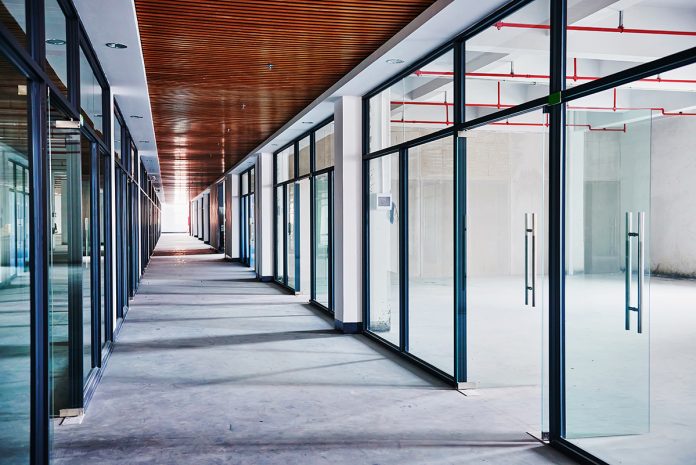We stand at a critical moment in the changing nature of work and our relationship to it. PLACEmaking takes a look at how the COVID-19 pandemic has had a significant impact on how and where we work
Organisations in all sectors and of all sizes are rethinking their office-related workplace provision, operation and policies. A desire for a new ‘blended’ pattern of working is emerging including time spent working from home, in a satellite or third-party location, with only minimum time spent in a corporate hub. Remote working has matured from the ‘emergency’ of lockdown and as a result, acres of office buildings will sit under-utilised unless we and think innovatively about the future.
As we shift from crisis management (focused on containment of the COVID virus) to one of recovery management to aid a ‘new normal’ we need to proactively support staff throughout this transition to a sustainable long-term solution and be aware of the reality of some people’s work and life experiences. The need to network, mentor, share and collaborate are elements, that for many, the last 15 months have deprived us of.
The new way of working does not mean making a binary choice between wholly at home or the office so we will need the skills, tools and cultural shift to help us all navigate between and around multiple choices. The workplace of the future will be blended, richer and more diverse in nature, with both remote and office-based solutions being part of how we approach the way we work. This approach will need to go hand in hand with the development of new skills to sustain productivity and motivation in a world mixing virtual and physical presence and in networking, mentoring and collaborating in new ways.
The historical context of the ‘new normal’
Conventional wisdom had been that offices were critical to the standing and stability of the successful organisations, maintaining managerial control, driving team productivity and cohesiveness, building corporate culture and values and attracting the best talent. Many leadership teams focused on workplace solutions seen to drive up building efficiency, intensify use, promote colocation of teams and encourage face to face collaboration. Densification, occupancy, open plan offices and hot-desking were the buzz words of the facility planners focused on efficiency.
During the early stages of enforced home working organisations were encouraged to maintain some sort of pseudo normal office routine and the same focus on facility efficiency and not user experience persisted: complex and expensive cleaning rituals, socially distanced desk designation, enforced one-way circulation routing prevailed. Added to the anxiety of travelling on public transport, people very quickly realised that going to the office required high levels of tolerance and endurance and unless they absolutely had to be there, they exercised the option of working from home.
Before attempting to step backwards to pre COVID ways because this is how we always did it we need to safeguard our ability to ‘leap forward’ – one that will see us emerge into a solution fit for purpose, able to sustain many of the advancements made over the past 15 months whilst tackling the issues that have emerged. This requires us to take a wholly holistic approach to the workplaces of the future acknowledging things that we’ve previously assumed is nothing to do with work: mental and physical health and wellbeing, work life balance, social awareness, caring responsibilities, personal motivation, career planning, skills development, creativity and innovation as well as a renewed focus on how organisations develop, nurture and sustain a desirable corporate culture.
Creating a road map
In order to meet the challenges of the future property professionals in collaboration with others need to rationalise, rebalance and repurpose much of the office estate and how it operates to better meet the huge potential, many obstacles and challenging implications of our transformed relationship to work.
We need to:
- Change the purpose of the office – from individuals working at a desks to groups of people collaborating and interacting with others, enabled to participate physically or virtually.
- Minimise the hierarchically allocated offices and meeting rooms – maximise ‘informal’ spaces available to everyone
- Change the focus from ‘meetings’ to collaborative creativity, problem solving and solution focused activities
- Increase proportion of space for highly transient working, with a wide range of options reflecting differences of preferences, expressing the value of informal collaboration as well as recognising the need for short durations for secure interactions
- Rethink the relationship between employer and employee, encourage good decision making, problem solving, innovative thinking and support flexibility of different styles and approaches
- Incentivise use of facilities more evenly across the working week: consider options for sharing facilities with other outside your core hours
- Shift from individual ‘ownership’ of space towards a culture based on shared use of facilities and services on an ‘needs’ basis.
There is a risk for some that fear of the new forces them to grip on to the old and attempt to resist the tide of change to new ways of working. Our responsibility must be to resist the temptation to rebuild working within walls and present this as reverting back to pre-COVID-19 ‘business as usual’. Embracing new patterns of working might appear daunting, but organisations would be wise to view this as a moment in time uniquely delivering an opportunity to make positive change: to examine their options and appraise their current working practices and workplaces as fit to meet the challenges of the post COVID-19 future.
Still have doubts? Look around your empty offices. Ask yourself does it reflect a way of working that has already been left behind? Will it seduce your best talent to leave the comfort of their home ‘office’, tolerate commuting just to sit at a desk all day and repeat that several days per week? Realistically the answer is likely to be ‘no’.
PLACEmaking
Please note: This is a commercial profile
© 2019. This work is licensed under CC-BY-NC-ND.











